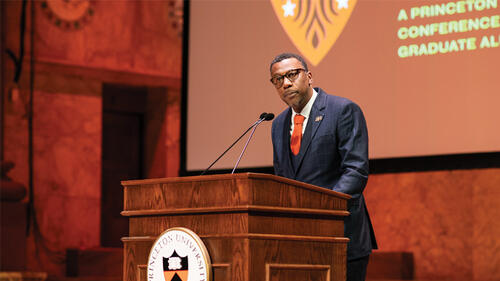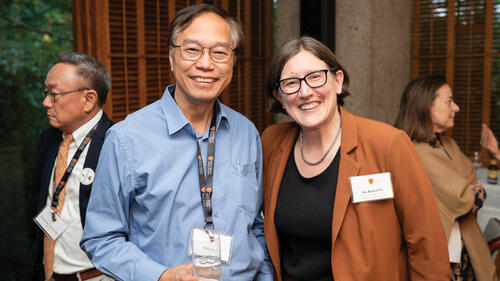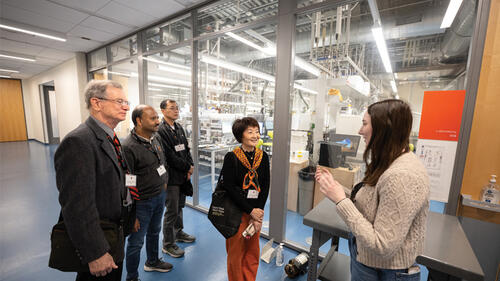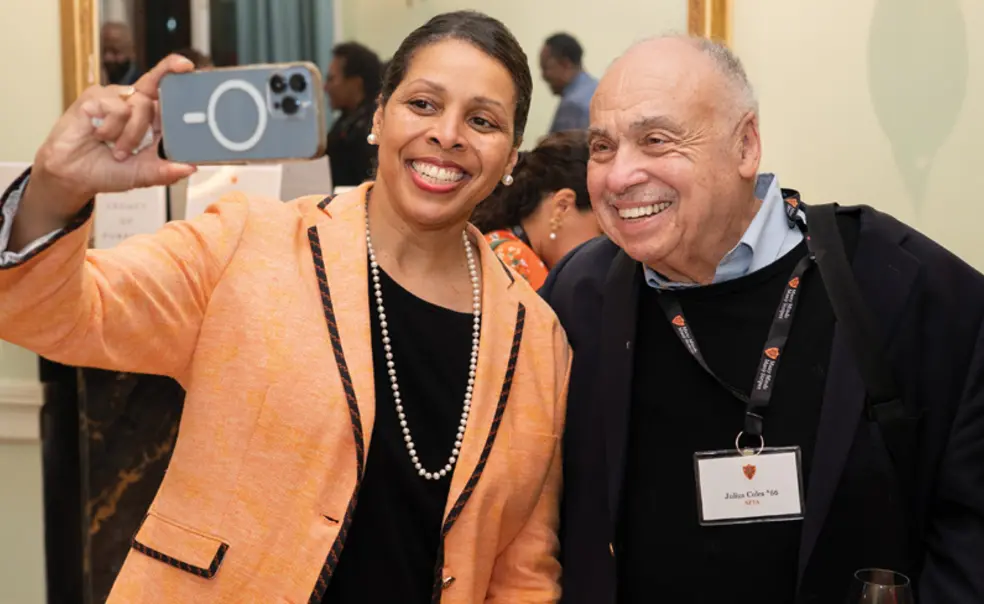Princeton Graduate School Celebrates 125 Years at Many Minds, Many Stripes Conference
More than 900 graduate alumni and guests gathered on campus Oct. 9 to 11 for the first Many Minds, Many Stripes conference for graduate alumni in 12 years. This year’s celebration coincided with the Graduate School’s 125th anniversary and explored how higher education can change to adapt to a rapidly shifting world.
In the upper hallway between Chancellor Green and East Pyne, a history display presented by the Princetoniana Committee highlighted pivotal moments in graduate scholarship, including famous firsts such as Howard Edwards Gansworth 1901 *1906, the first Native American student to earn a Princeton graduate degree, and other notable graduate alumni, including five decades of James Madison Medalists.

In his welcoming remarks, Dean of the Graduate School Rodney Priestley trumpeted the transformational impact of the graduate school. “Princeton’s graduate school has had a storied history since its founding, and is continuing the legacy of graduate education today,” he said. “Now in the current moment, there is ample rhetoric about the current state of higher education, but I’m here to tell you that Princeton’s Graduate School is thriving.”
Nancy Cole *76, a School of Public and International Affairs (SPIA) alumna, drove from Milwaukee to make the conference. She also attended last year’s Every Voice conference, which recognized Princeton’s LGBTQ+ alumni. “I’m just becoming so enamored with my alma mater of 50 years that I’m back again, and I may come next year, because it will be my 50th,” she said. Cole has never been to Reunions but hopes that next year will be her first.
Robert Johnston *70, another SPIA alum, took the train from New York City for the conference. “In this troubled time, what can be done, and what can universities do?” he said. “We stand up for academic freedom. The president spoke strongly for it.” Johnston also recalled his years on campus during the late 1960s Vietnam War protests, when the University was led by President Robert Goheen ’40 *48.
At a Friday morning conversation, President Christopher Eisgruber ’83 echoed Priestley’s remarks and emphasized Princeton’s commitment to free expression. He spoke about the importance of having respectful free speech on college campuses, the subject of his book Terms of Respect: How Colleges Get Free Speech Right, released in September. “Our job is to allow for passionate, emotional, sometimes offensive discussion to take place on the campus, while also generating the forum that allows for more deliberate, truth seeking, reasoned argument about what goes on, and to do that in an inclusive way,” Eisgruber said.
Panels throughout the weekend, many led by graduate alumni, explored the state of higher education, free speech, technology, and global change. “I know we’re all grappling with the craziness of this moment, and I think it’s important for us to be in community together, to have conversations to try to talk it out,” said Princeton professor Eddie S. Glaude Jr. *97 at a Friday talk on leadership and public service.
Amaney Jamal, dean of SPIA, spoke on a panel with SPIA alumni Ajay Bisaria *09 and Cara Abercrombie *03. Jamal discussed the need to have empathetic policymaking, build trust with stakeholders, and adapt to a new technological and educational environment in public service.
“The realm of politics has lost its stability, and for politics to continue to do the job of a good society, we must work to bring civility back into politics,” she said.

Other panels and talks focused on using artificial intelligence, navigating moral complexities in the rapidly changing world, expanding educational access to underrepresented communities, and accelerating economic mobility in America. Provost Jennifer Rexford ’91 interviewed Sarah Nagy *14, who received her master’s in finance and founded Seek AI, about what’s at stake as artificial intelligence and academic institutions evolve.
The conference also highlighted mentorship and pursuing nontraditional career paths. At the kickoff on Thursday, graduate alumni shared how their time at Princeton shaped their lives today. Many highlighted the importance of an interdisciplinary, liberal arts education and pursued paths different from those they had initially expected when they entered graduate school.
At the event, Yasmin Elhady *15, a SPIA alumna, lawyer, and comedian who holds five degrees, discussed the challenges she faced while pregnant with scoliosis. She shared her doula’s advice to listen and be curious about her pain while she was in labor, and said 60 seconds later, her baby was born. She likened this journey to the current climate. “You know, in this moment, it may feel like we're in a lot of pain, but we have to be awake for it. We have to lean into that pain. We’ve got to get curious about what's coming, because something new is going to spring forward,” she said.

In a conversation at Labyrinth Books, graduate alumni authors discussed how their studies influenced their writing, even as they ventured outside of academic publishing. Peter Lighte *81, who earned his degree in East Asian studies, spoke about being an “indie author” and how his knowledge of Chinese languages led him to a banking career instead of an academic one. This eventually led to his memoir, Straight Through the Labyrinth, about being a gay man adopting a daughter from China.
Current graduate students also joined the conversation and spoke about their time at Princeton, the communities they’ve found on campus, and the extracurricular activities that complement their academic experiences. Graduate alumni in the audience asked questions about residential life and opportunities for alumni mentorship. Nikita Taniparti, a Ph.D. student in anthropology, said her GradFUTURES alumni mentors have helped her talk through a range of concerns, from general exams to career anxiety.
“It was just like a really nice informal but informed avenue to always know that you could email this person, and they don’t need context of what you’re going through,” she said. “Being mentored has helped me be a better mentor as well, to undergraduates and other people hoping to come to graduate school.”
For the Record
Sarah Nagy *14’s graduate department was listed incorrectly in an earlier version of this story. She received her master’s degree in finance.












1 Response
Mark Banash *92
3 Months AgoRigor and Resources Defined Graduate School Experience
I enjoyed the November article on the graduate alumni conference and 125 years of the Graduate School (Princetonians). It made me reflect on my own time there, and I thought I might supplement the piece with some observations that I think reflect positively on the school.
My own department — chemistry — was considerably more strenuous than what my peers experienced at their institutions. The department had rigorous requirements like the submission of research proposals beyond your core area of study as well as foreign language exams that were completely absent from what my friends had to do for their doctoral work. I often think they got off light when it comes to what they had to do to earn their degree.
But in the time since I received my Ph.D., I have come to believe that what I have overlooked most in my time there was the large number of excellent resources Princeton has. I did experimental physical chemistry, so if our department stockroom didn’t have a part, chances are Jadwin’s did or I could take a bus over to Forrestal and raid theirs. I had access to the math/physics library as well as the one in Frick and the one in the E-Quad. If I needed a brush-up on my math, chances are there was a class in engineering that could fill the gap. I still use the knowledge I picked up in the short course offered in the physics department on electronics for experimental science. And I fondly remember going to Firestone to read Suetonius, just for fun.
All I can say is that in over three decades of doing experimental physical science, I have never found my Princeton education wanting. And politeness forbids me from commenting further on the gaps I have observed with many of my peers.